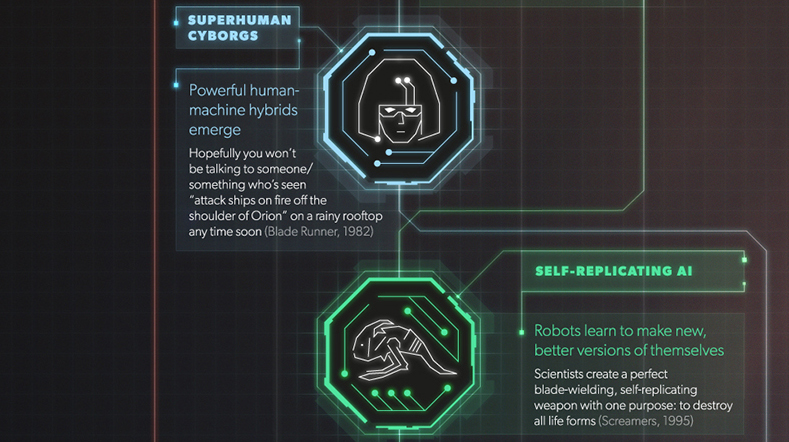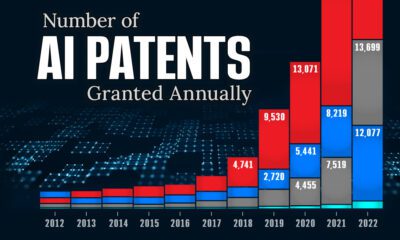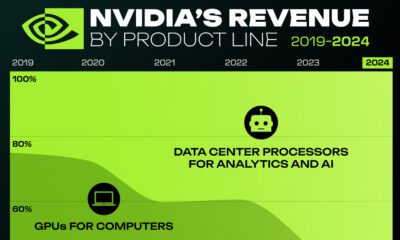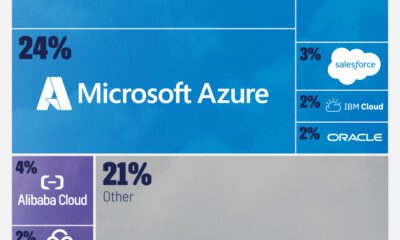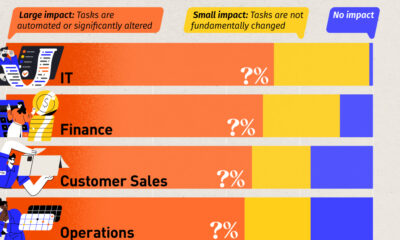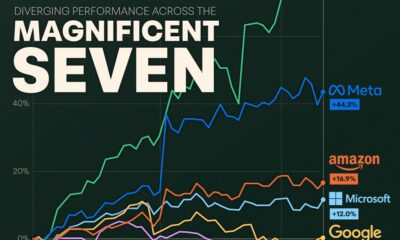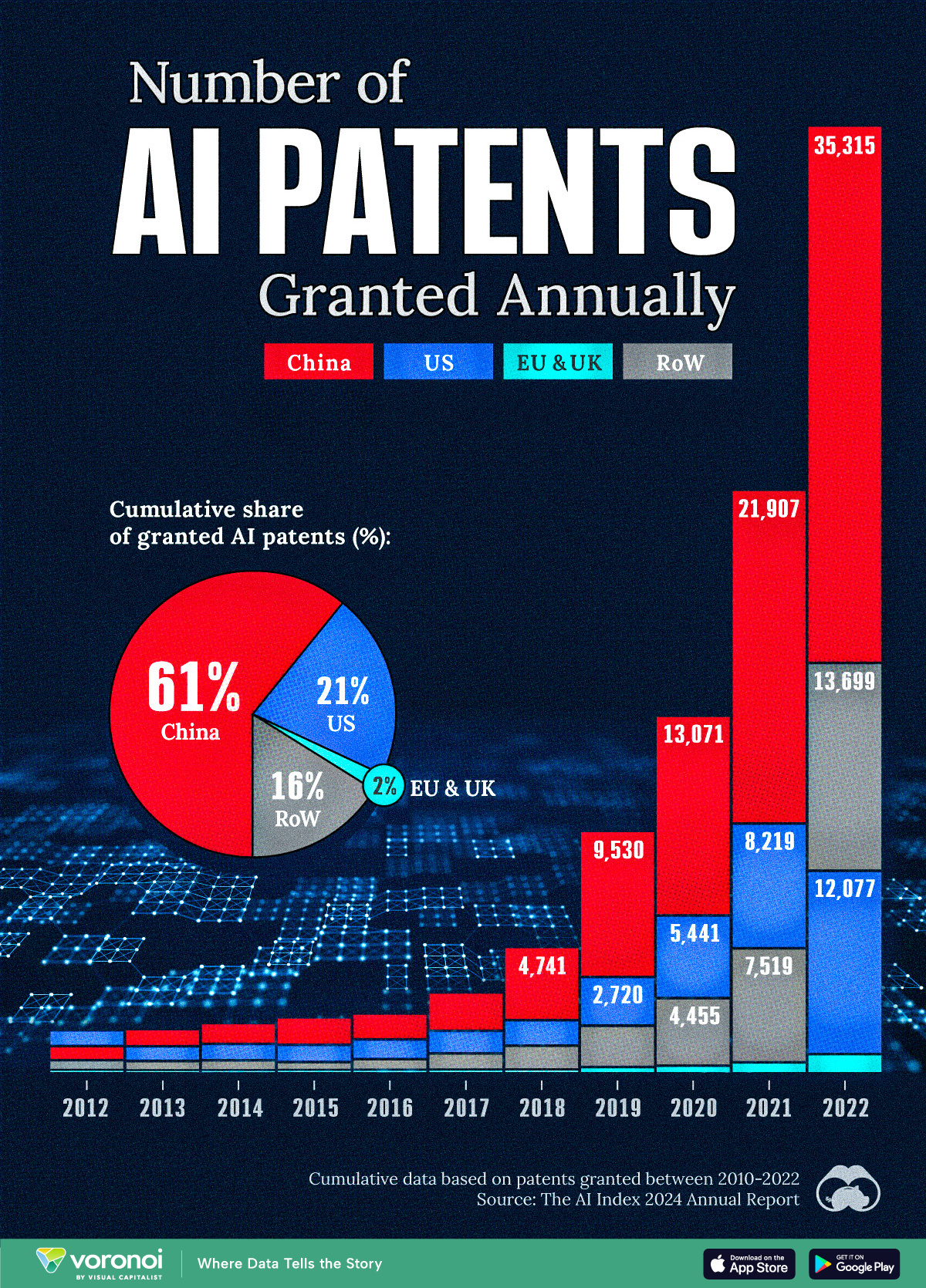Technology
The Future of Artificial Intelligence, According to Pop Culture
The unpredictable nature of superintelligent, self-improving machines lends itself quite nicely to the dramatic storylines of movies and books.
It’s a science fiction writer’s dream: if AI becomes smart enough to create more advanced versions of itself, pretty much every outcome is on the table. Machines could empower humanity to become enlightened and virtuous. On the less optimistic side? Machines could instead ruthlessly enslave all of humankind to tickle their own warped sense of satisfaction.
Pop Culture Perspectives
From the plot of movies like The Terminator to The Matrix, pop culture offers up innumerable examples of what could happen from the rise of the machines – and most of them, as you can imagine, steer towards the less optimistic side of the spectrum.
Today’s infographic from BBC Future provides an entertaining take on these scenarios, organized by potential likelihood.
Note: Infographic removed at request of BBC. To see it, click link above – or see our other AI infographic here.
Some experts see AI having a $15.7 trillion impact on our economy, but pop culture offers up a slightly different perspective of what the future may hold.
Future AI Scenarios
Here are just some of the scenarios offered up in mainstream movies, books, and television shows. Some are apocalyptic and dystopian, and some seem just plain bizarre:
Seductive Siris: In 2013’s Her, Joaquin Phoenix falls in love with an intelligent operating system named Samantha.
Self-Replicating AI: In 1995’s Screamers, scientists create a self-replicating weapon with one purpose: to destroy all life.
The Singularity: AI vies to take over the world in 1982’s classic Tron.
Rampaging Robots: In 1973’s Westworld, recently re-envisioned as a different TV series by HBO, murderous androids go on a killing spree in a futuristic Disney-style theme park.
Feeling Machines: In the 1999 movie Bicentennial Man, a household robot experiences emotions, creative thoughts, and eventually develops sentience.
Androids Among Us: Artificial beings infiltrate society undetected in TV series Battlestar Galactica.
Human Enslavement: In the 1999 movie The Matrix, all life on Earth is an elaborate facade. The robots are really the ones in command, but you wouldn’t know it until you take the “red pill”.
Mind Upload: Digitized humans gain immortality and then wreak havoc, such as in 2014’s Transcendence.
One Certainty
While some of these ideas seem far-fetched, it’s worth noting that not all future scenarios are as distant as they may seem.
With computing power increasing exponentially, the tail end of the hockey stick could happen sooner than we may think.
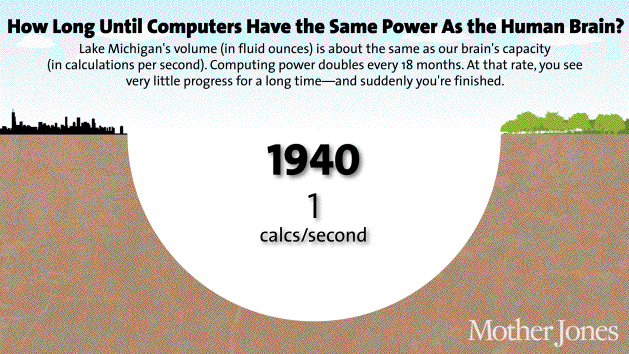
Technology
Visualizing AI Patents by Country
See which countries have been granted the most AI patents each year, from 2012 to 2022.
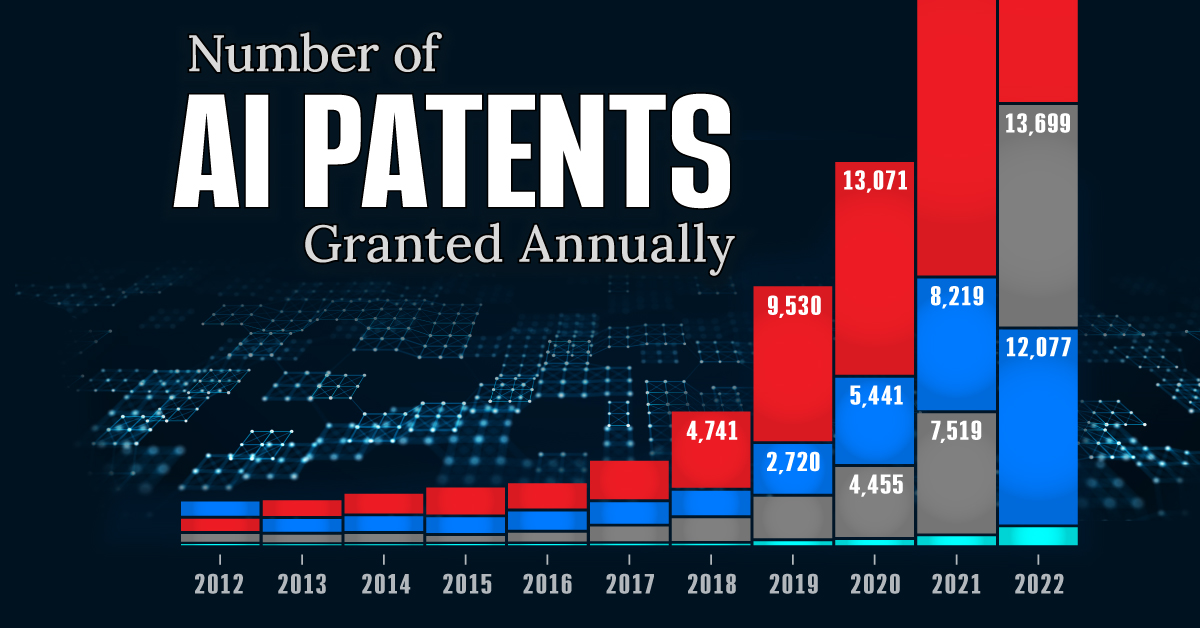
Visualizing AI Patents by Country
This was originally posted on our Voronoi app. Download the app for free on iOS or Android and discover incredible data-driven charts from a variety of trusted sources.
This infographic shows the number of AI-related patents granted each year from 2010 to 2022 (latest data available). These figures come from the Center for Security and Emerging Technology (CSET), accessed via Stanford University’s 2024 AI Index Report.
From this data, we can see that China first overtook the U.S. in 2013. Since then, the country has seen enormous growth in the number of AI patents granted each year.
| Year | China | EU and UK | U.S. | RoW | Global Total |
|---|---|---|---|---|---|
| 2010 | 307 | 137 | 984 | 571 | 1,999 |
| 2011 | 516 | 129 | 980 | 581 | 2,206 |
| 2012 | 926 | 112 | 950 | 660 | 2,648 |
| 2013 | 1,035 | 91 | 970 | 627 | 2,723 |
| 2014 | 1,278 | 97 | 1,078 | 667 | 3,120 |
| 2015 | 1,721 | 110 | 1,135 | 539 | 3,505 |
| 2016 | 1,621 | 128 | 1,298 | 714 | 3,761 |
| 2017 | 2,428 | 144 | 1,489 | 1,075 | 5,136 |
| 2018 | 4,741 | 155 | 1,674 | 1,574 | 8,144 |
| 2019 | 9,530 | 322 | 3,211 | 2,720 | 15,783 |
| 2020 | 13,071 | 406 | 5,441 | 4,455 | 23,373 |
| 2021 | 21,907 | 623 | 8,219 | 7,519 | 38,268 |
| 2022 | 35,315 | 1,173 | 12,077 | 13,699 | 62,264 |
In 2022, China was granted more patents than every other country combined.
While this suggests that the country is very active in researching the field of artificial intelligence, it doesn’t necessarily mean that China is the farthest in terms of capability.
Key Facts About AI Patents
According to CSET, AI patents relate to mathematical relationships and algorithms, which are considered abstract ideas under patent law. They can also have different meaning, depending on where they are filed.
In the U.S., AI patenting is concentrated amongst large companies including IBM, Microsoft, and Google. On the other hand, AI patenting in China is more distributed across government organizations, universities, and tech firms (e.g. Tencent).
In terms of focus area, China’s patents are typically related to computer vision, a field of AI that enables computers and systems to interpret visual data and inputs. Meanwhile America’s efforts are more evenly distributed across research fields.
Learn More About AI From Visual Capitalist
If you want to see more data visualizations on artificial intelligence, check out this graphic that shows which job departments will be impacted by AI the most.
-
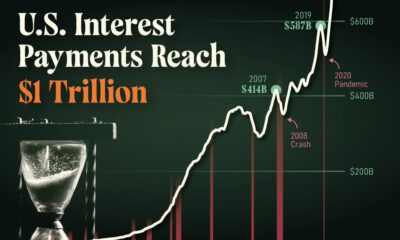
 Markets1 week ago
Markets1 week agoU.S. Debt Interest Payments Reach $1 Trillion
-

 Markets2 weeks ago
Markets2 weeks agoRanked: The Most Valuable Housing Markets in America
-

 Money2 weeks ago
Money2 weeks agoWhich States Have the Highest Minimum Wage in America?
-

 AI2 weeks ago
AI2 weeks agoRanked: Semiconductor Companies by Industry Revenue Share
-

 Markets2 weeks ago
Markets2 weeks agoRanked: The World’s Top Flight Routes, by Revenue
-

 Countries2 weeks ago
Countries2 weeks agoPopulation Projections: The World’s 6 Largest Countries in 2075
-

 Markets2 weeks ago
Markets2 weeks agoThe Top 10 States by Real GDP Growth in 2023
-

 Money2 weeks ago
Money2 weeks agoThe Smallest Gender Wage Gaps in OECD Countries

